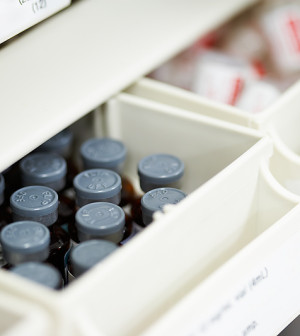- Could Your Grocery Store Meat Be Causing Recurring UTIs?
- Are You Making This Expensive Thermostat Error This Winter?
- Recognizing the Signs of Hypothyroidism
- 10 Strategies to Overcome Insomnia
- Could Artificial Sweeteners Be Aging the Brain Faster?
- Techniques for Soothing Your Nervous System
- Does the Water in Your House Smell Funny? Here’s Why
- Can a Daily Dose of Apple Cider Vinegar Actually Aid Weight Loss?
- 6 Health Beverages That Can Actually Spike Your Blood Sugar
- Treatment Options for Social Anxiety Disorder
Researchers Don’t See Long-Term Benefits From Drug for Preemies


Although magnesium sulfate is routinely given to pregnant women at risk for very preterm delivery, new research suggests it won’t provide any long-term benefits for infants.
After analyzing the effects of magnesium sulfate given to pregnant women, researchers in Australia found it had no benefit on brain, behavioral, growth or functional outcomes among those children when they were assessed at between 6 and 11 years old.
The new findings don’t negate the fact that the drug is helpful in preventing cerebral palsy in infants, the researchers pointed out in the study, published in the Sept. 17 issue of the Journal of the American Medical Association.
Infants born before the 28th week of pregnancy are at greater risk for long-term neurological problems than full-term babies, according to a journal news release. Magnesium sulfate is used to protect the brains of preterm infants. It’s also given to pregnant women at high risk for premature delivery to reduce their child’s risk of cerebral palsy.
In conducting the study, Dr. Lex Doyle of the University of Melbourne, and colleagues, randomly assigned pregnant women to receive magnesium sulfate or a placebo.
A total of 535 women were given magnesium sulfate, while 527 were given a placebo. All of the participants, from throughout Australia and New Zealand, were about to deliver or expected to give birth before 30 weeks of pregnancy.
The researchers then followed up on nearly 700 of these children at school age, when they were between 6 and 11 years old.
No association was seen between treatment with magnesium sulfate during pregnancy and any long-term risks or benefits, compared with the placebo, the researchers found.
More research is needed to examine magnesium sulfate’s long-term benefits, the study authors concluded.
More information
The American Congress of Obstetricians and Gynecologists provides more information on magnesium sulfate use during pregnancy.
Source: HealthDay
Copyright © 2026 HealthDay. All rights reserved.










